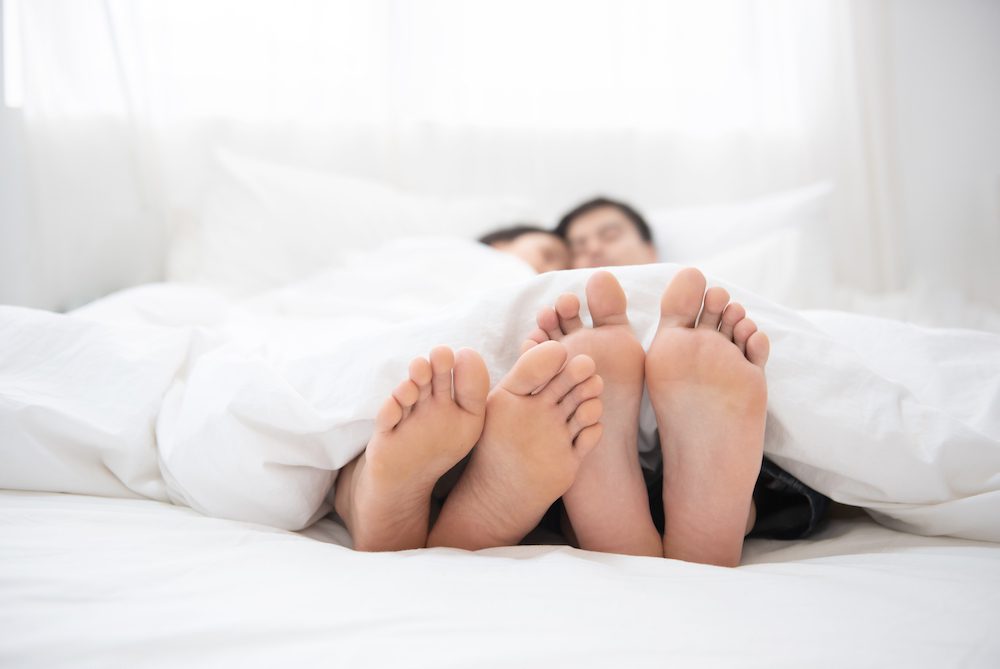It’s not always easy to get a full night of quality sleep. In fact, one-third of adults in the United States don’t sleep enough. Sleep loss can lead to higher risks of serious health problems, including type 2 diabetes.
Managing diabetes becomes difficult when you don’t get enough sleep. For example, sleep affects food choices and how your body reacts to insulin. People with diabetes are also more likely to have sleep disorders. We discuss links between diabetes and sleep as well as tips to help people with diabetes sleep more easily.
The Connection Between Sleep and Diabetes
Diabetes and sleep share a two-way relationship. Not only do long-term sleep problems increase the risk of developing diabetes, but diabetes can also interfere with the quantity and quality of a person’s sleep.
Sleepless nights may interfere with normal metabolism. Metabolism is the body’s process of using calories and turning them into energy to carry out important functions such as digestion, breathing, and brain function. Research suggests that not getting enough sleep affects metabolism and plays a role in the development of type 2 diabetes.
Losing sleep alters the way the body processes sugar. Sleep deprivation also disrupts the release of grehlin, the hormone that regulates hunger, and leptin, the hormone that regulates feelings of fullness. Both of these effects may raise a person’s risk of developing diabetes or make diabetes harder to manage.
For people living with diabetes, symptoms of nerve pain, frequent nighttime urination, or restless legs, can make it difficult to sleep.
What Is Diabetes?
Diabetes happens when a person’s body either doesn’t make enough of the hormone insulin or can’t use it effectively. Insulin carries sugar from food, also known as glucose, into your cells so they can use glucose as energy. Without enough insulin, glucose builds up in the blood to high levels and can damage your body’s organs and tissues.
There are two types of diabetes: type 1 diabetes and 2 diabetes. People with type 1 diabetes don’t produce any insulin. Typically, type 1 diabetes is often diagnosed in younger people such as children, adolescents, and young adults. However, people can be diagnosed with type 1 diabetes later in life as well.
Most people with diabetes have type 2 diabetes. People with type 2 diabetes make insulin but their bodies can’t use it effectively to control blood glucose levels. The risk of developing type two diabetes is increased in children and adults with obesity, those with a family history, and people who do not regularly exercise.
People with insulin resistance or prediabetes are at risk for developing type 2 diabetes. Insulin resistance means that the body doesn’t respond well to insulin. At first, the body makes more insulin to make up for it but eventually blood glucose levels elevate. Prediabetes is when blood glucose levels rise above normal but still below levels seen in diabetes.
Rarely, some people get diabetes while they are pregnant. This is called gestational diabetes. Gestational diabetes may resolve following the birth of a baby. However, half of people with gestational diabetes develop type 2 diabetes.
Does Lack of Sleep Affect Blood Sugar Levels?
Not getting enough sleep or frequently waking up at night can weaken the body’s ability to move glucose out of the blood. This can lead to higher blood glucose levels and risk of prediabetes or diabetes. Research shows that sleep loss can weaken diabetes and prediabetes control in people with these conditions.
Even healthy people who don’t sleep enough put themselves at greater risk for developing prediabetes. Evidence suggests that sleep loss impacts the body’s response to insulin in people with no other risk factors for diabetes.
Sleep deprivation can also lead to overeating. Several studies have found that sleep loss leads to changes in the hormones grehlin and leptin that signal the body when to feel hungry or full. Sleep deprived people have reported cravings for high-carbohydrate sweet or salty foods and increased snacking.
The effects of sleep loss can make diabetes more difficult to control. Sleep loss worsens insulin resistance, leads to overeating, and makes it difficult to maintain a healthy weight. It also elevates blood pressure, weakens the immune system, and increases the odds of developing anxiety and depression.
Common Sleep Disorders Associated With Type 2 Diabetes
People with diabetes face a higher risk for sleep disorders, and many often report poor sleep and excessive daytime sleepiness.
Insomnia
Insomnia is common in people living with diabetes. In fact, 50% of people with diabetes report dealing with chronic insomnia. There is also research to suggest that insomnia may increase the risk of developing diabetes.
People with insomnia find it difficult to fall asleep or stay asleep. Insomnia can cause a range of problems that affect everyday life including feeling sleepy during the day, changes in mood, and difficulty with concentration and memory.
Diabetes can cause symptoms that interfere with a person’s ability to sleep well. For example, people with diabetes complain of frequent nighttime urination, which occurs due to high glucose levels, keeping them up at night. For some, diabetic neuropathy causes pain and discomfort, which get in the way of quality sleep.
If you are living with diabetes, talk to your doctor about any symptoms that may be making it difficult for you to sleep. Your doctor may be able to help develop a plan to ensure you get the rest you need.
Sleep Apnea
Sleep apnea and diabetes are associated in several ways. People with obstructive sleep apnea (OSA), the most common type of sleep apnea, are more prone to insulin resistance and type 2 diabetes. Both sleep apnea and diabetes share a common risk factor which is obesity.
Obstructive sleep apnea is characterized by frequent interruptions in breathing during sleep. People with OSA commonly snore during sleep and experience symptoms that affect their quality of life. For example, morning headaches, mood changes, excessive daytime sleepiness, and difficulties with concentration are all common among people living with untreated OSA.
Although OSA and type 2 diabetes often occur together, research has not determined whether one causes the other. However, researchers believe that sleep disruptions may contribute to type 2 diabetes and more research is needed.
People living with diabetes that are concerned about obstructive sleep apnea should talk with their doctor. There are a range of effective treatment options for people with OSA including continuous positive airways pressure (CPAP) therapy.
Restless Legs Syndrome
Restless legs syndrome (RLS) occurs more commonly in people with diabetes causing leg discomfort and an overwhelming desire to move the legs.
The symptoms of RLS are usually worse in the late afternoons, evenings, and before bedtime. Moving the legs only temporarily helps the discomfort before the urge to move them again returns. RLS interferes with sleep quality and impacts quality of life.
Nerve pain causes similar symptoms to RLS, and the two conditions often occur simultaneously. For this reason, health care providers may not identify or misdiagnose RLS in people with diabetes. Talking with your doctor about any symptoms that might suggest RLS is important since the treatments for RLS and diabetic nerve pain are different.
Treatment for diabetic neuropathy includes managing glucose levels and pain relief medication. The treatment for RLS typically involves a combination of prescription medications as well as lifestyle changes, including relaxation exercises, and massage.
How to Improve Your Sleep If You Have Diabetes
Making lifestyle changes and practicing good sleep hygiene can help you manage your glucose levels. In turn, maintaining proper glucose levels will help to improve your sleep.
- Stick to a bedtime schedule: Go to bed and wake up at the same time each day, including on weekends. Maintaining a consistent sleep schedule can help prepare you to wind down each night. Consider incorporating bedtime rituals such as writing in a journal, meditating, or taking a bath.
- Set up the bedroom for success: Create a sleep environment that promotes a good night’s rest. Keep your bedroom cool and dark. If noise affects your ability to fall asleep or stay asleep, consider a white noise machine.
- Stay active: Keep active or exercise during the daytime to help yourself sleep well at night. Exercise helps improve insulin sensitivity if you are diabetic which could mean you do not need to take as much insulin. Exercising outside during the day has the added benefit of helping to maintain your sleep-wake cycle and ensure quality sleep.
- Avoid alcohol, nicotine, and caffeine: Like caffeine, nicotine is a stimulant and can keep you from falling asleep. Alcohol can sometimes seem like a way to relax in the evening. However, drinking alcohol in the hours leading up to bed can disrupt your sleep. For those with diabetes and restless leg syndrome, it is generally recommended to avoid caffeine and tobacco.
- Avoid late afternoon naps: If you’re going to nap, consider napping in the early afternoon and no later than 3 p.m. so that you do not have trouble falling asleep when it is time to go to bed.
- Avoid screen use at night: Avoid the use of technology in the hour or so leading up to bed. This means turning off devices such as TVs and other devices that emit blue light which can disrupt the production of melatonin and make it hard to sleep. turn off your cell phone.
References
Ask the Sleep Doctor
Have questions about sleep? Submit them here! We use your questions to help us decide topics for articles, videos, and newsletters. We try to answer as many questions as possible. You can also send us an email. Please note, we cannot provide specific medical advice, and always recommend you contact your doctor for any medical matters.




